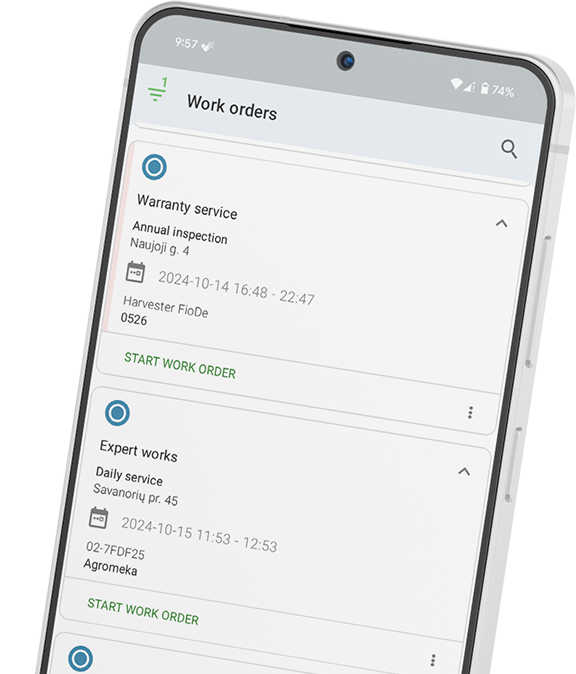Supaprastinkite savo lauko paslaugų operacijas.
Mūsų integracijų sąrašas dažnai atnaujinamas. Daugiau informacijos apie kiekvieną integraciją rasite atskirame puslapyje.
Paprastai lauko paslaugų valdymas apima asmens ar aukštos kvalifikacijos komandos siuntimą įdiegti, remontuoti ar prižiūrėti įrangą, programinę įrangą, sistemas ar bet kokį kitą turtą. Lauko technikams dirbant su jiems paskirta užduotimi, lauko paslaugų vadovas (-ai) užtikrina tinkamą užduoties įvykdymą.
Paprastai tariant, lauko paslaugų vadovo tikslas – užtikrinti tinkamą išteklių ir darbuotojų paskirstymą kiekvienai konkrečiai užduočiai atlikti. Be to, jie stebi ir koordinuoja vietoje dirbančių aptarnavimo specialistų darbą.
Lauko paslaugų valdymas gali apimti:
Iš esmės, tikslas FSM programinė įranga turėtų būti optimizuoti informacijos srautą iš patalpose esančių agentų ir darbuotojų į galinį biurą. Paprasčiau tariant, tai labai pažangus žmogiškųjų išteklių valdymo programinės įrangos ir CRM derinys.
Tačiau paprastesnę FSM programinę įrangą dažnai galima integruoti su bet kuria iš šių dviejų programų. Tinkama lauko valdymo paslaugų programinė įranga visada turėtų būti derinama su įmonės turto valdymo sistemomis ir vietoje esančiais lauko duomenimis.
Bet kuriai įmonei, kurios pagrindinis arba antrinis pajamų šaltinis yra lauko paslaugos, vertėtų įdiegti lauko valdymo praktiką ir programinę įrangą.
Veiksmingos lauko valdymo paslaugų praktikos ir sprendimų diegimas yra naudingas visai įmonei. Visų pirma, efektyvi lauko valdymo paslauga susijusi su išteklių naudojimo optimizavimu.
Tokia praktika gali būti naudinga, pvz:
Bet kuriai įmonei, kurios pagrindinis arba antrinis pajamų šaltinis yra lauko paslaugos, vertėtų įdiegti lauko valdymo praktiką ir programinę įrangą. Nors yra daugybė programinės įrangos variantų, geriausios praktikos dažniausiai išlieka tos pačios įvairiose pramonės šakose.
Žinoma, pirmas žingsnis optimizuojant lauko paslaugų teikimą – turėti gerą stebėjimo ir registravimo įrankį. Šiuo metu dažniausiai tai būna pasirinkta lauko paslaugų valdymo programinė įranga. Tačiau pati programinė įranga yra tik įrankis, kuris gali būti naudingas arba apsunkinantis.
Taikydami geriausią lauko valdymo paslaugų teikimo praktiką, vadovai gali gauti daugiau naudos iš programinės įrangos ir lauko technikų. Iš esmės geriausią praktiką galima suskirstyti į 3 dideles kategorijas: aptarnavimo, projektų ir techninės priežiūros.
Aiškaus ir nuoseklaus kiekvienos technikų komandos grafiko palaikymas yra labai svarbus gero lauko paslaugų valdymo aspektas. Visa jų diena sukasi apie judėjimą tarp sričių ir taisymo ar diegimo darbų atlikimą. Bet koks nuklydimas ar painiava galiausiai lemia nereikalingas išlaidas.
Iš planavimo išplaukiantis maršruto optimizavimas yra kitas svarbus darbo vietoje valdymo aspektas. Vidutinis per dieną nuvažiuojamas atstumas yra įprastas pagrindinis veiklos rodiklis. Užtikrinant, kad nė vienas iš šių kilometrų nenueitų veltui, sumažėja bendros paslaugų sąnaudos, pagerėja atvykimo laikas ir padidėja klientų pasitenkinimas.
Galiausiai, labai svarbu tiksliai sekti darbą. Užtikrinus, kad lauko agentai turėtų visą reikiamą informaciją, o vidinis biuras visada būtų informuotas apie pažangą, sumažėja lėtėjimo ar klaidų tikimybė. Be to, stebint darbų sąnaudas galima sužinoti apie kitus optimizavimo būdus.
Gera FSM neapsiriboja vien tik lauko darbų atlikimu. Nors svarbiausia užtikrinti, kad technikai galėtų efektyviai atlikti savo darbą, konkreti užduotis dažnai yra tik viena iš didesnio projekto dalių. Efektyvus jų valdymas gali gerokai padidinti bendrą sąnaudų grąžą.
Svarbiausia gero projekto valdymo savybė – suskirstyti visą projektą į kelis etapus. Užtikrinant, kad kiekviena dalyvaujanti šalis žinotų visą svarbiausią informaciją apie etapus, jų pradžios ir pabaigos laiką, bendrą pažangą ir t. t., sukuriama informuota ir veikli aplinka.
Be to, aiškaus, glausto ir struktūrizuoto sąskaitų faktūrų išrašymo būdo nustatymas gali duoti puikių rezultatų. Paprastai iš anksto žinant bendras projekto išlaidas ir mokėtinus mokėjimus, klientai yra gerokai labiau patenkinti ir laikosi įsipareigojimų.
Galiausiai visos lauko paslaugų įmonės turėtų rūpintis savo turtu. Nepriklausomai nuo to, ar tai būtų fizinė įranga, sistemos, ar programinė įranga, visą turtą reikia valdyti ir prižiūrėti.
Todėl reguliarus testavimas ir techninė priežiūra yra labai svarbi efektyvaus mobiliojo darbo dalis. Tačiau gebėjimas numatyti gedimus ir užkirsti jiems kelią nėra vienintelis tikslas. Testavimas leidžia lauko paslaugų vadybininkui turėti aiškų supratimą apie turto būklę ir suteikia galimybę organizuoti lauko darbus pagal turimus išteklius.
Galiausiai, tinkamai atlikus bandymus, iš anksto suplanavus turto aptarnavimą, visi dalyviai išvengia daug galvos skausmo. Jei klientai iš anksto sužino, ar atvyks lauko technikų komanda, jie turi galimybę parengti savo verslo procesus, kad galėtų palaikyti aptarnavimo procedūras. Tinkamai suplanavus, įprastinė klientų kasdienė veikla beveik nesutriks – tai neabejotinai padės susikurti puikią reputaciją.
Didėjant nuotolinio ir lokalaus darbo svarbai, didėja ir lauko paslaugų valdymo svarba. Maksimaliai padidinti kiekvieno darbuotojo užduočių efektyvumą – tai reiškia, kad reikia aplenkti konkurentus, mažinant išlaidas ir didinant klientų pasitenkinimą. Visa tai galima pasiekti taikant lauko paslaugų valdymą.
Norite sužinoti, kaip padidinti savo lauko technikų efektyvumą? Skaitykite Frontu dienoraštis daugiau informacijos apie FSM, programinę įrangą ir procesų optimizavimą!

Mūsų integracijų sąrašas dažnai atnaujinamas. Daugiau informacijos apie kiekvieną integraciją rasite atskirame puslapyje.

Link copied!